Camping can be a great way to enjoy nature and get some exercise. However, certain aspects of camping can be challenging to deal with if you’re not careful. Bugs are one of the biggest problems that campers face. Not only are they annoying, but they can also make your campsite unpleasant and dangerous. Here are some tips on how to deal with bugs while camping.
1. Pack a Tent With Bug-Proof Fabric
When planning a camping vacation, the first thing you should do is pack a tent. However, not all tents are created equally. Some tents are made with poor quality materials, and have weak seams that can easily be broken. This makes these tents very vulnerable to bugs, making your tent infested with insects. To prevent this from happening, you should pack a tent that has bug-proof fabric. This type of fabric is designed to repel bugs without repelling humans.
2. Use a Bug Spray
Another way to protect yourself from bugs when camping is by spraying. You can also use a bug-repellant lotion to eliminate the bugs already inside your tent. Bug sprays are designed to kill the insects that come in contact with them, including mosquitoes, ticks, chiggers, and fleas. These sprays work by making your skin feel uncomfortable and irritating. Once you spray yourself with this solution, the insects will be forced to leave your body. Many bug sprays also contain DEET, which is a chemical that is used to repel insects.
3. Use Citronella Candles
Another way to repel bugs is to use citronella candles. Citronella is the most potent natural insect repellent, and it can be used in a variety of ways. You can light citronella candles in your tent, under your picnic table, or in areas where you will be spending most of your time while camping. Citronella candles are very effective at repelling mosquitoes, flies, and other insects. They also work by making your tent smell like citronella, which is a great way to keep the bugs away.
4. Clean Your Tent Regularly
It would help if you also cleaned your tent regularly to prevent bugs from living in it. This is especially important if you’re camping in a very humid area, common in the summer. If you don’t clean your tent, it will become infested with insects, and they can start breeding, making the smell of your tent unpleasant. However, you should be careful when cleaning your tent because you should avoid using any chemicals that are harmful to humans. Using mild soap and water, you can easily clean your tent without spending a lot of money.
5. Start A Fire
Camping in a tent can be challenging because it is hard to keep warm. However, you should start a fire when camping so that you can stay warm at night. You can start a fire using matches or a lighter, but it is best to use a fire starter to create sparks. These are designed to make your campfire sparkle, and burn brighter than it would normally burn. You can also build fires using different methods, but the most important thing is that you should make sure that your fire is safe, and won’t cause any harm to yourself or the environment.
6. Look For A High And Dry Campsite
You should also look for a high and dry camping site, so that you can prevent insects from living in your tent. This is especially important if you’re camping in an area with many insects. When choosing a good campsite, you should be careful because it is essential to choose one far away from any water sources and free of plant life. If possible, you should also look for a site with no trees or bushes nearby. This will prevent the insects from living in your tent.
7. Rub Yourself With Onions
Camping can be extremely challenging because it’s often very hot and humid in the summer. However, you should rub yourself with onions to ward off insects, which can be a great way to stay healthy while camping. You should rub your entire body with onions to ward off insects during your camping trip, which will help you stay comfortable while camping. This is a great way to stay healthy, and prevent bugs from living in your tent, which is extremely important if you want to enjoy your camping trip without being bothered by insects.
8. Don’t Use Scented Hygiene Products
Scented hygiene products are not designed for outdoor use. Many people like to use them because they smell good, and are more convenient. However, using this product can attract more bugs than it repels. Also, the scent is not strong enough to keep bugs away from the area you’re camping in. Try to use unscented products, or clean the area with soap and water. By doing this, you will keep the area clean and safe.
9. Use A Bug Zapper
Bug zappers are a great way to keep insects away from your tent. These devices are made up of a light bulb and a mesh grid, often made out of plastic. The mesh grid is usually connected to the light bulb via a wire. The combination of the light bulb and the mesh grid attracts insects, and keeps them away from tents. You can also use bug zappers in areas with few bugs because they have the same effect on all kinds of insects.
10. Limit The Light In Your Tent
If you’re camping in a forest, the chances of bugs being attracted to your tent are high. The reason for this is that most insects are light-sensitive. Therefore, bright light is a great way to lure them into your tent. However, if you want to enjoy a good night’s sleep without having bugs crawling all over you, you need to limit the amount of light that passes through your tent. A simple solution is to use blackout curtains. You can also try using a mosquito net over your bed, and placing it near the door so that it blocks out as much light as possible.
11. Camp Near Plants That Are Natural Repellents
The most effective way to deal with bugs while camping is to stay near plants that are natural repellents. If you camp near plants such as sagebrush, yucca, and cacti, you should be able to keep the insects away. These plants have a repulsive scent that bugs hate. They will avoid them even if they’re not poisonous or toxic. When you add these plants to your campground, you’ll find that the number of buzzing insects will decrease dramatically.
The above tips will help you deal with the annoying insects that invade your campsite. You should now be able to enjoy a relaxing camping trip without getting bitten by mosquitoes and other bugs. Consider using the tips you’ve just learned to make your camping trip even more enjoyable.




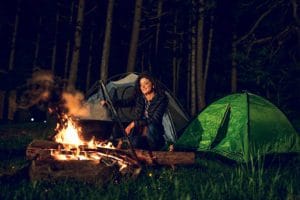


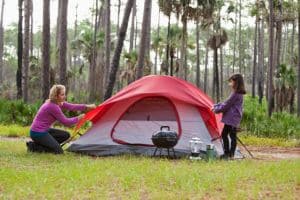


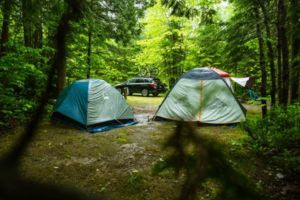
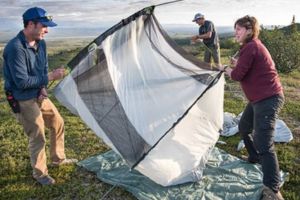
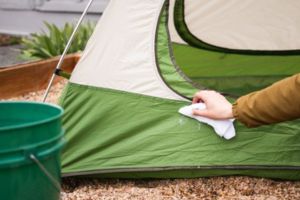
Leave A Comment